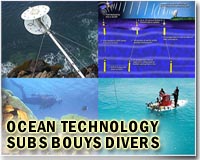 |
Nairobi, Kenya (SPX) Feb 14, 2011 Marine conservationists from the Wildlife Conservation Society working in Kenya have found that better fisheries management that includes restricting fishing gear is producing more predatory and longer-lived species and is improving fishing even in adjacent areas where no management is taking place. During a 10-year study, conservationists recording fish catches found that the implementation of fishing regulations-and particularly the banning of small-mesh seine nets that indiscriminately capture all fish-allowed practically all fish species to recover, especially those species that took longer to reproduce. Fish communities in regulated sites also had a greater diversity of predatory fish species and those with longer life spans. Even in unregulated areas there were small improvements to the fish community. The study appears in the February print version of Fisheries Management and Ecology. The authors of the study include Dr. Tim McClanahan of the Wildlife Conservation Society and Christina Hicks of James Cook University in Australia. The study examined the effects of increasing fisheries management and fishing gear restrictions in 11 coral reef sites along the 75-kilometer stretch of Kenyan coast around the city of Mombasa for a 10-year period. The wholesale removal of fine-mesh seine nets was implemented in six sites to the south of Mombasa, all of which were more than 30 kilometers away from areas closed to fishing. Kenyatta Beach-a landing site and popular tourist destination near Mombasa Marine National Park-served as the study's most intensively regulated site. The northernmost sites, where fishermen continued to use seine nets in spite of restrictions, were within five kilometers of the fisheries closure zones. In addition to seine nets, other types of gear examined in the study were traps, lines, regular nets, and spears. "The study shows that regulating coastal fisheries allows fish populations to recover in a number of predictable ways that correspond with knowledge of the biology and ecological characteristics of individual species, but also that the recovery was faster then predicted for some species," said Dr. Tim McClanahan, WCS Senior Conservationist and head of the society's coral reef research and conservation program. From February 1998 to August 2007, researchers identified and measured individual fish from 152 species caught at each of the 11 sites-with 15 species representing approximately 90 percent of the data pool-as well as recording the gear used. On average, all fish species from regulated sites over the course of the study increased in body length over time, with two species-the rabbitfish (averaging a short lifespan of 5.9 years) and seagrass parrotfish (averaging a intermediate lifespan of 7.7 years)-exhibiting the most significant size increases following fishing regulations. The unregulated northern sites were dominated by short-lived herbivorous species and the very few species that were able to escape the gaps of small-meshed nets. Predictably, the largest and longest lived fish were landed at the most regulated site (Kenyatta), and the smallest in the least regulated. Further, spears and gill nets caught the largest fish in the study, whereas the smallest were caught in seines and lines. Also, fish body lengths in the sites where seine net bans were implemented and enforced during the study were growing to the same lengths as fish from the most regulated site by the end of the study. Dr. McClanahan said the improvements even in the unregulated areas suggest that strong management can improve conditions in adjacent areas where management is weak. "This can lead to either free loading on the nearby stronger management or increased interests in participating in the improved management, depending on the interests, incentives, and organization of the fishing and management community," McClanahan said. The study builds on a previous WCS study from the same sites on the costs and revenues of local fisheries along the coast of Kenya, which was published last year in Conservation Biology and demonstrated that effective fisheries management actually yields more profits for fishermen. In terms of income, fishermen working in Kenyatta experienced a 60 percent increase in revenue (from 224 up to 374 Kenya shillings, or $3 up to $5) following the beach seine ban in 2001. By contrast, daily income in the northern sites averaged $2 per person between 2002-2007. Overall, fishing revenue in the southern landing sites (all of which banned beach seines during the study period) was 41 percent higher than northern coast sites with the beach seines; Kenyatta's fishing revenue climbed to 135 percent higher than northern sites after seine elimination. Dr. Caleb McClennen, Director of the Wildlife Conservation Society's Marine Program, said: "This important comparison of various fisheries management systems over time demonstrates the critical need to move past unregulated open-access fishing in resource poor countries around the world. This empirical evidence demonstrates how both fishers and their supporting ecosystems can and do benefit from restrictions and improved management."
Share This Article With Planet Earth
Related Links Wildlife Conservation Society Water News - Science, Technology and Politics
 Thailand closes dive spots due to reef damage
Thailand closes dive spots due to reef damageBangkok (AFP) Jan 21, 2011 Thailand has closed a host of popular dive sites to tourists indefinitely to allow coral reefs to recover from widespread bleaching caused by warmer sea temperatures, authorities said Friday. In total 18 areas in seven marine parks are off-limits, according to an order by the Thai National Park, Wildlife and Plant Conservation Department. "Diving in all the spots is to be halted indefini ... read more |
|
| The content herein, unless otherwise known to be public domain, are Copyright 1995-2010 - SpaceDaily. AFP and UPI Wire Stories are copyright Agence France-Presse and United Press International. ESA Portal Reports are copyright European Space Agency. All NASA sourced material is public domain. Additional copyrights may apply in whole or part to other bona fide parties. Advertising does not imply endorsement,agreement or approval of any opinions, statements or information provided by SpaceDaily on any Web page published or hosted by SpaceDaily. Privacy Statement |